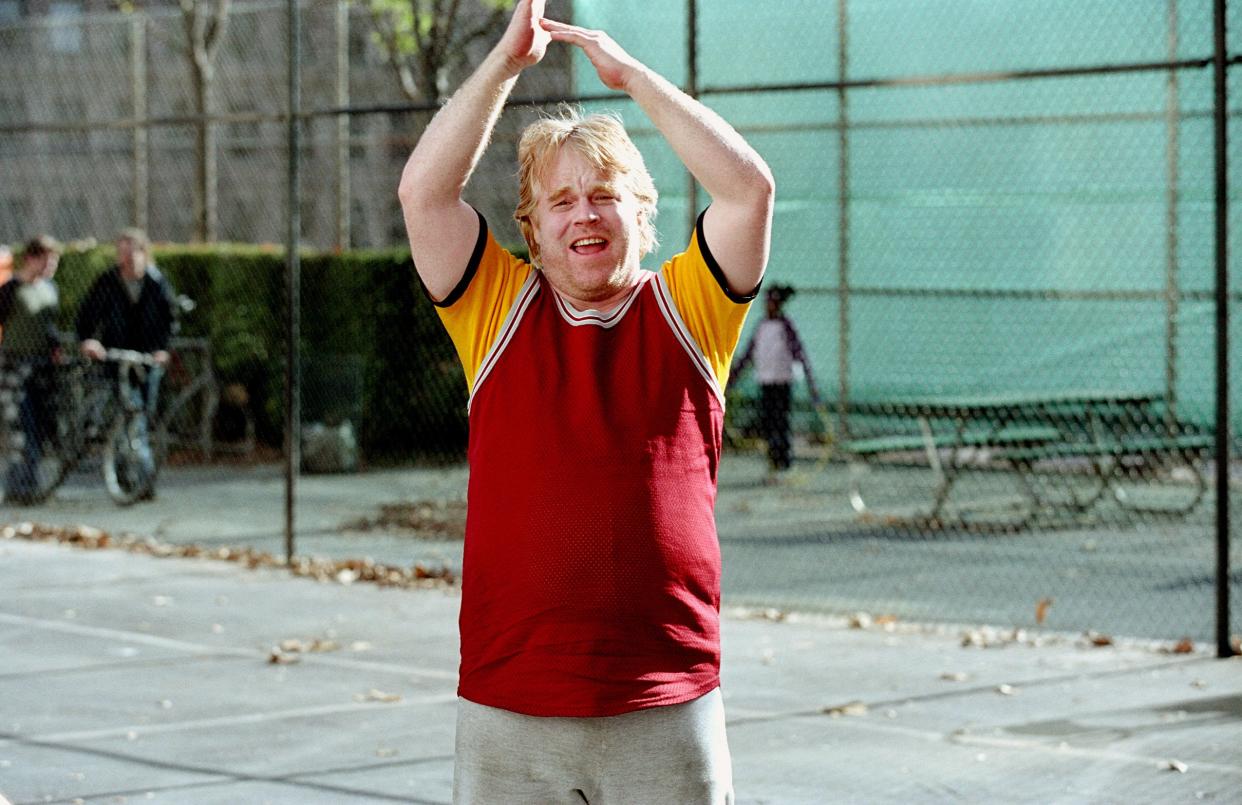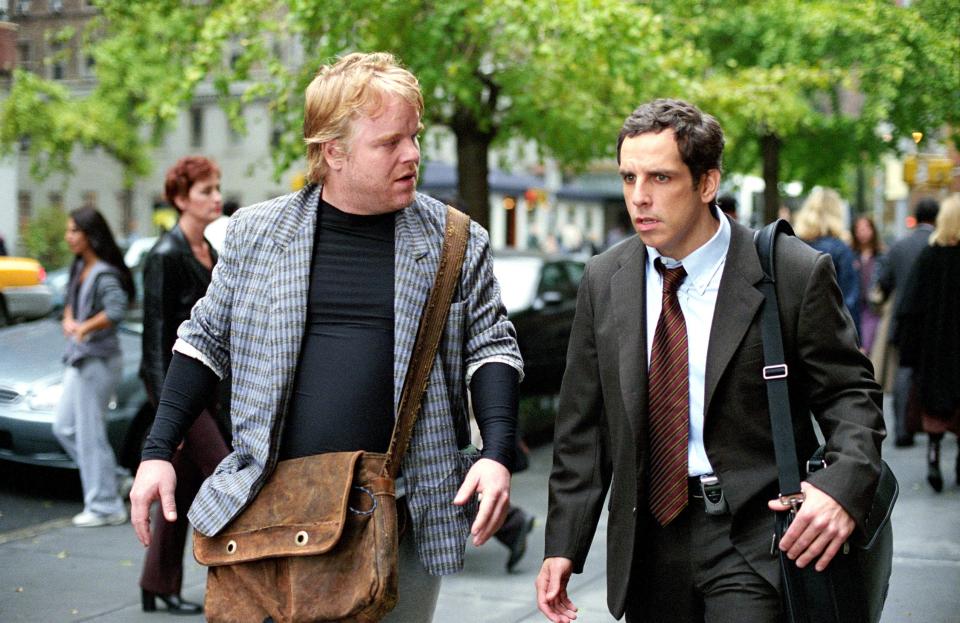Philip Seymour Hoffman Made Bad Basketball Hilarious— and Delivered One of his Greatest Performances— in this Early-00s Rom-com

- Oops!Something went wrong.Please try again later.
- Oops!Something went wrong.Please try again later.
- Oops!Something went wrong.Please try again later.
- Oops!Something went wrong.Please try again later.
Philip Seymour Hoffman seemed tentative. Over the first few days of shooting Along Came Polly, writer-director John Hamburg noticed the future Oscar-winner hadn’t yet grasped the absurdist and abrasive nature of his character Sandy Lyle, a former child star with an inflated ego and crude sense of humor. While shooting a scene at Joe’s Pizza, Hoffman played things low key. And when production moved to a makeshift basketball court, he barely raised his voice before shooting a backboard-clanging brick. “Let it rain,” he muttered on his jump shot.
“He was anxious because he hadn't been in a comedy and he didn't want to look stupid,” Hamburg says. “People get nervous when they don't want to look dumb.”
But the 2004 rom-com—released twenty years ago this week, with Ben Stiller as an uptight risk-assessment analyst and Jennifer Aniston as his bohemian love interest—needed Hoffman to be eccentric, not uptight. So Hamburg approached him on the court with a note. “Phil, you know this guy thinks he's Michael Jordan?” he explained. “Obviously it's covering a deep insecurity.” The next take, Hamburg asked Hoffman to give him something extra, promising another solution if the idea didn’t work. The actor obliged.
“LET IT RAIN,” he screamed in close-up, blasting the ball well above the hoop.
“The whole crew cracked up,” Hamburg recalls. “At that moment, he was like, ‘OK, I see what this character is.’”
Throughout the rest of the sequence, in which Sandy and Stiller’s character Reuben take on a pair of sweaty randoms, Hoffman hits his lung-burning stride. “You two douche-bags bring your A-game?” he razzes at his opponents, nicknaming himself “White Chocolate” while driving the lane and chucking up a mountain of bricks. At one point, when Reuben asks Sandy to switch defenders, Hoffman blurts out an improvised retort: “I just figured out how to cover this man right here.” It was classic New York pick-up trash talk. More importantly, it was classic Sandy Lyle. Hoffman had found him. “I would talk to my editor Bill Kerr every night after looking at the previous day's footage,” Hamburg says. “He was just like, ‘Dude, this is absolute gold.’”
For most cinephiles, Sandy doesn’t rank with Hoffman’s best roles—the mullet-wearing goofball is an endearing, supporting outlier in the actor’s canon. And yet, 20 years later, Hoffman’s dedicated portrayal of Sandy remains beloved, a permanent fixture in the pantheon of romantic-comedy best friends. Unlike the half-written sidekicks in many of those films, Sandy is more than his brash antics; he gains self-awareness, comes to terms with his career, and earns a heroic final moment before the credits roll. “Maybe that’s why Phil gravitated toward it,” Hamburg says. “He was so gifted and so unique and gave so much of himself and took this ridiculous character I had written and humanized him so beautifully.”
To a certain extent, Sandy was born from Hamburg’s past. The director remembers auditioning for 1979’s The Champ during an elementary school casting call and being “crestfallen” after missing out on the part. But his imagination sat with him. What if he’d gotten famous at 10 years old? What if his life were defined by it? As he wrote Polly, Hamburg channeled those same worries into Sandy, Reuben’s long-time pal who’s constantly reminded of his only notable accomplishment: playing the “bagpipes kid” in the movie Crocodile Tears. As a result, Sandy overcompensates for his unfulfilled potential, acting like a big shot and even hiring a camera crew to film his own E! True Hollywood Story. “He thought that he was Daniel Day-Lewis,” Hamburg says. “And he just wasn’t.”
In the writing stage, Hamburg had always intended for Hoffman to play Sandy. Hoffman had auditioned for a role in Hamburg’s feature debut Safe Men, released in 1998; Hamburg had followed Hoffman’s rising star in movies like The Talented Mr. Ripley and Magnolia, and was drawn to his commitment and range. At the time, plenty of comedians could have fulfilled the “slovenly best friend” archetype, but Hamburg was convinced Sandy needed more dramatic heft—someone who could play wounded and insecure underneath his outsized personality. In other words, Stiller’s foil couldn’t just be a wacky punchline. “It's just sort of my theory that the characters in comedies think they're in dramas,” he says. “I thought Phil would be perfect for it.”

That’s evident in an early scene when Reuben first meets Polly at an art gallery. After complaining of excessive horniness to a group of strangers on the elevator ride, Sandy later interrupts Reuben to relay a bowel emergency. “I’m in a situation here,” he says above a whisper, panting heavily, eyes partially closed. “I just sharted.” In other hands, that scatological portmanteau might have made for an unconvincing gross-out moment, turning Sandy into a caricature. But the scene works—and the word entered the vernacular—because of Hoffman’s stressed and anxious delivery, his intense proximity to Stiller, and his saddled walk to the exit. “The key was how seriously he played it,” Hamburg says. “That was the whole intention—that he's playing it like the stakes are really high for him.”
As Brian Abrams recounts in his book You Talkin’ To Me?: The Definitive Guide To Movie Quotes, Hamburg and Hoffman spent a number of takes getting the rhythm and emphasis of that exchange just right. It was one of a few instances in which the pair butted heads creatively, a process that fueled Hoffman’s otherwise congenial presence on set. “It was really more of an inner conflict,” Hamburg says. “He wanted to be great.” Ahead of Adam McKay and Judd Apatow’s improvisational influence on studio comedies, Hamburg had a distinct vision for every line and inflection. “I felt like I'd written a really good specific character and that if he just played it straight and committed, it would be memorable,” Hamburg says. “But he took it to places I could have only dreamt up.”
What further separates Sandy from the more disposable “best friend” subgroup is the completeness of his character arc. After sabotaging his community theater production of Jesus Christ Superstar (Hamburg liked the idea of Sandy becoming “a bull in a china shop” around a group of earnest amateur actors), he stops posturing and gives a real performance—this time, in front of board members at Reuben’s office. The final speech in rom-coms is generally reserved for the lead, but Sandy’s throat-clearing, bombastic insurance pitch saves Reuben’s job, lets Reuben save his relationship, and leads to some personal closure for Sandy, who finally accepts his status as a loser. “Yes, he's a comic character, but he's meant to have real pathos and really have this kind of earnest moment at the end,” Hamburg says. “I thought it would be really sweet and redemptive.”
Several years later, after an NYU alumni screening of the movie, Hamburg remembers walking home with Hoffman through Greenwich Village. As they talked, Hoffman recalled being initially frustrated by fans recognizing him on the street and shouting “Let it rain!” By then he’d won an Oscar, for 2005’s Capote, and had starred in far more prestigious films, working with directors such as Spike Lee, Paul Thomas Anderson, and Charlie Kaufman. Why was he still being recognized as the sharting, brick-throwing Sandy Lyle?
“I think he wrestled with that for a while,” Hamburg says.
In time, however, Hoffman assured him that he’d learned to embrace Along Came Polly and the way Sandy had unmistakably trickled into the cultural lexicon. “It's so hard for things to break through,” Hamburg says. “I think he ended up loving it.” Almost a decade since his untimely passing, the actor’s anecdote of appreciation—and the opportunity to have worked with him—still makes Hamburg smile. “It fills me with nothing but a sense of warmth and gratitude.”
Originally Appeared on GQ

